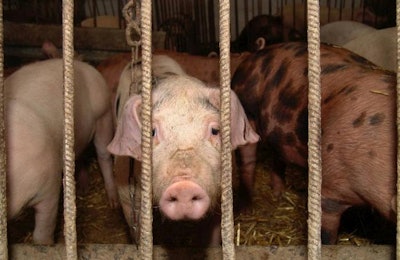
Signed in Denmark’s capital, Copenhagen, last week, the Memorandum of Understanding covers the meat from 1001 pigs from a Danish Crown cooperative member reserved for sale to Chinese consumers for the New Year in February 2018. The agreement was made with Tmall, one of Alibaba’s e-marketplaces in China.
“Partnering with Tmall has enormous potential for Danish Crown,” said Danish Crown Group CEO. Jais Valeur. “Chinese consumers are buying much more of their food online than anywhere else in the world. By selling our products through Alibaba’s e-marketplace, we get access to a vast sales platform and ensure that Danish Crown can become a pork provider of choice for the growing Chinese middle-class.”
“Danish produce enjoys an excellent reputation in China and I am pleased to announce this agreement with Danish Crown today,” said David Lloyd, Managing Director UK, Ireland & Nordics Alibaba Group. “Chinese consumers increasingly want reassurance that the meat they consume is of outstanding quality and reared to high-standards, and we look forward to working closely with Danish Crown to enable the 466 million annual active consumers on our e-marketplaces to buy quality Danish meat products on Tmall Fresh to enjoy at home.”
Under the agreement, the product range for Tmall will be selected, processed and packed at Danish Crown’s facility in Ringsted, Denmark. Production is scheduled to move to the firm’s new plant at Pinghu, near Shanghai, in early 2019.
China’s changing market
Danish Crown has been exporting pork to China since 1998, and sent 260,000 tons of the meat worth around EUR600 million (US$718 million) in 2016.
The agreement between Danish Crown and Tmall highlights a number of changes in the Chinese market. There has been and continues to be growth in the country’s middle classes and in online sales of food, and a series of scandals have increased the focus of consumers on food safety. These factors were mentioned by the companies’ executives at the signing ceremony.
There are also signs of change in China’s pig sector as it enters a new phase in the pork production cycle.
Chinese Ministry of Agriculture figures for January to May this year show for the first time a slowdown in imports of pork meat and offals, while incoming trade in beef and mutton continue to increase markedly.
This stagnation in imports stems from a recovery in local pork production, and strong international prices, according to a recent Rabobank report, which forecasts Chinese pork output to increase by 2 percent in 2017.
It appears that, when new environment regulations were introduced, many farmers abandoned pig-keeping. However, the high prices of 2016 may have encouraged those committed to the sector to invest, with production from that expansion now appears to be coming onto the market.
Wholesale pork prices in China are now around the level of 2015, but they remain 20 percent below those of a year ago, according to Ministry figures.
A recent review of global pork markets in Pig International indicates that total world output declined in 2015 and 2016, while it remained well ahead of the figures from 10 years previously.















